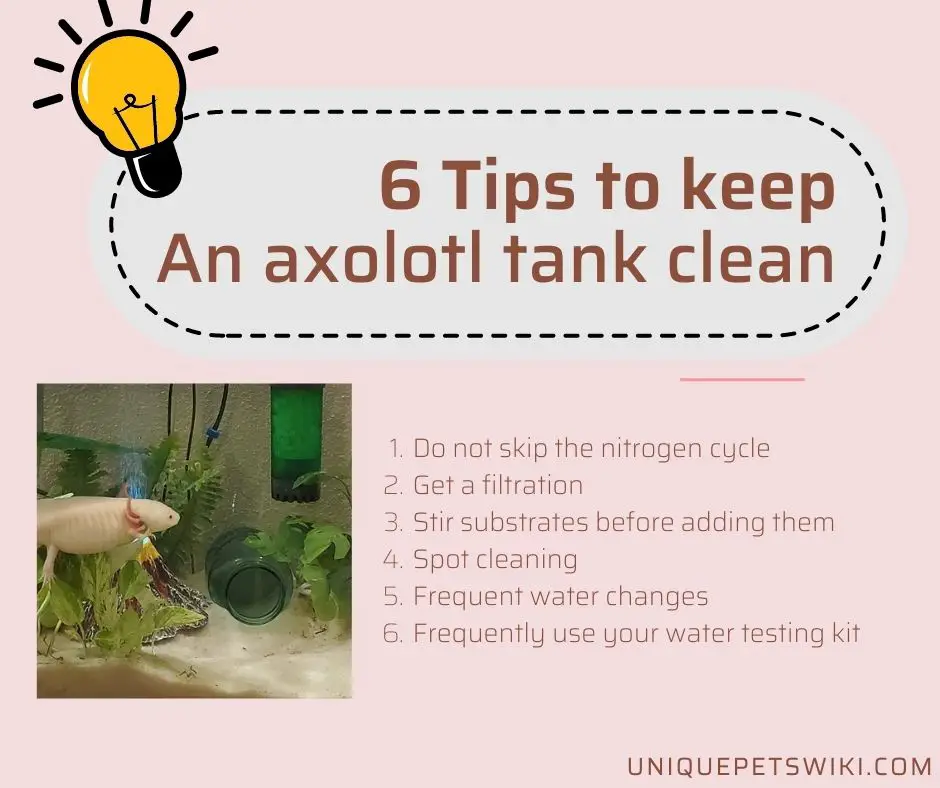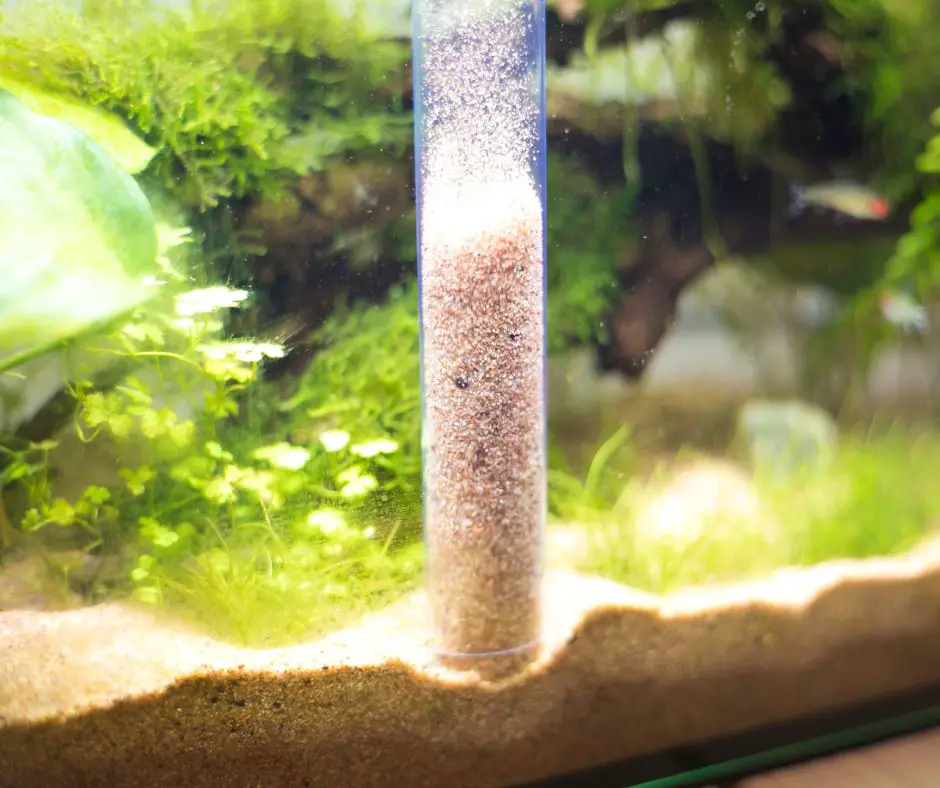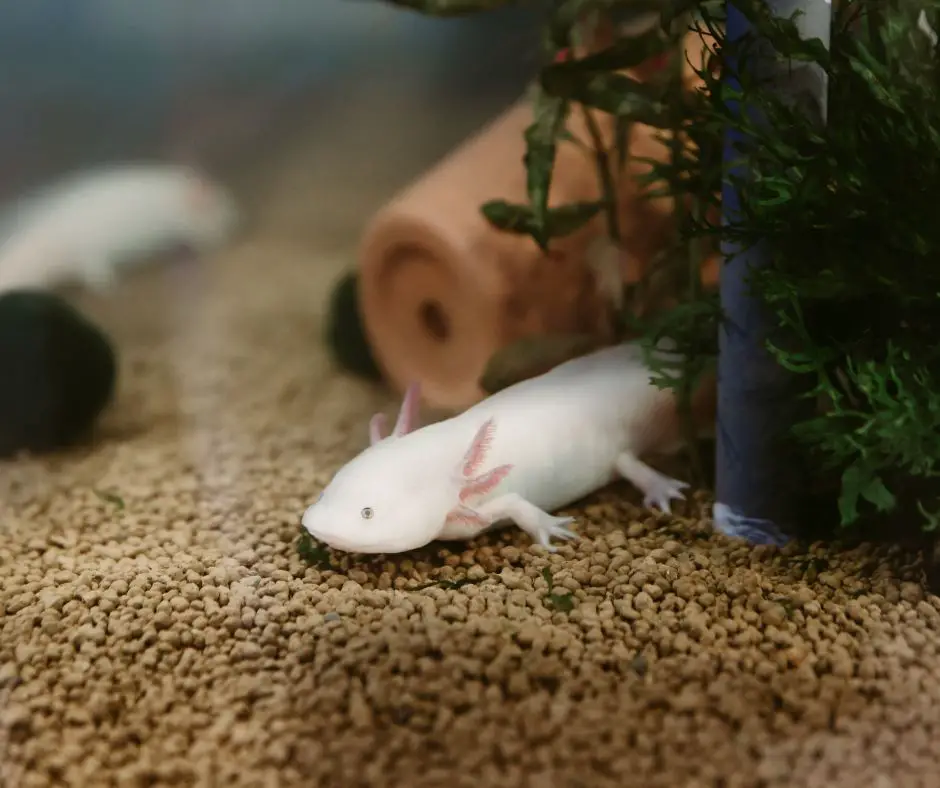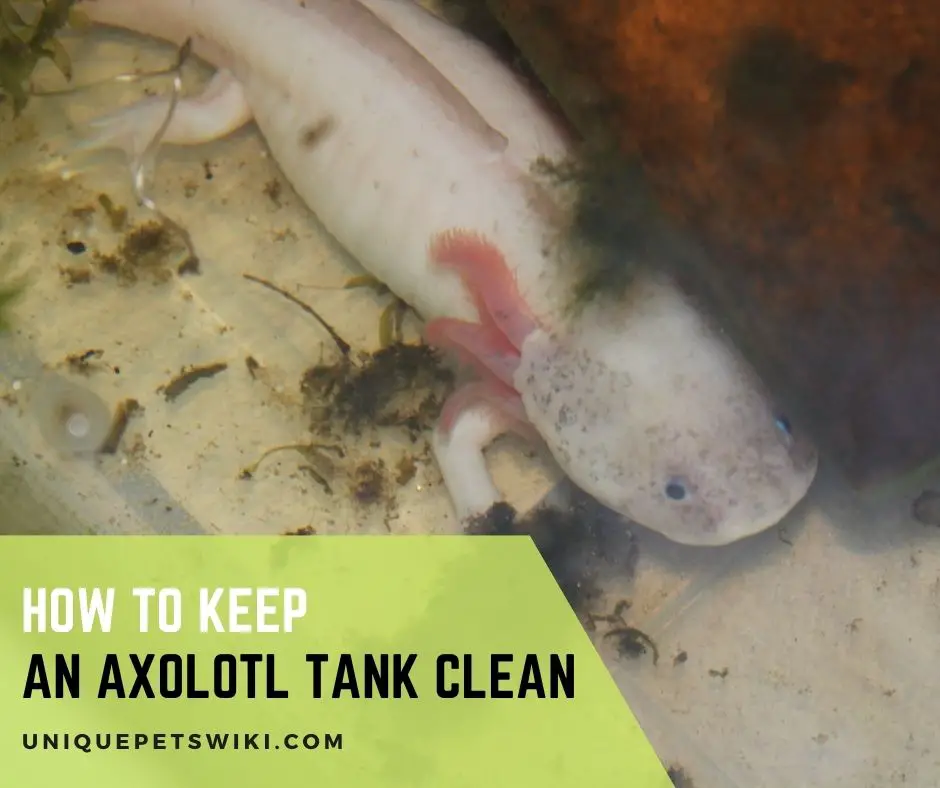Clean water is a requirement for the health and well-being of axolotls, and that’s why it’s so important to keep your axolotl’s tank clean.
However, if not done properly, the procedure can be stressful for your little friend.
Cleaning an axolotl tank is not as straightforward as it sounds, and many new axolotl owners wonder how to clean their tanks in the safest and smartest possible way and keep them clean for longer periods of time.
If you are one of those novice axolotl owners, this post is for you.
In this post, we are going to discuss everything you need to know about how to keep an axolotl tank clean.
Hopefully the tips below will make it easier for you to take care of your little friend. Keep reading!
Contents
6 Tips to Keep An Axolotl Tank Clean
To keep an axolotl tank clean, be careful about a few things. The process of cycling is tedious, but is important for maintaining healthy water parameters. Get a filtration.
Before you add substrates, stir them and remove contaminants. Clean axolotl poop whenever you spot it, and do a 20% water change every week.
A water testing kit can help you test water parameters and figure out when to clean the tank.

Do Not Skip the Nitrogen Cycle
Cycling a tank can be time-consuming, but it’s important. The process basically refers to regulating nitrogen cycle by establishing bacterial colonies.
If cycling is done properly, bacteria quickly breaks down ammonia, turning it into nitrite.
Another conversion takes place almost instantaneously: nitrite is converted to nitrate. The final product is nitrate, which keeps ammonia at 0 ppm.
Without the nitrogen cycle, high levels of ammonia in the water can kill your axolotl in just a few days.
Learn How To Cycle Tank For Axolotl: 7 Steps for Beginners.
Get a Filtration
An aquarium filter can keep the water clean and pristine. A filter can remove decaying organic matter, excess food, dangerous chemicals, free-floating particulates, and your axolotl’s waste products.
When choosing a filter, consider your tank’s water turnover rate. Filters are rated as “gallons per hour” or GPH.
Learn about the Best Water Filters For Axolotls and make an informed buying decision.
Stir Substrates Before Adding Them

Make sure you stir substrates before you add them, simply because substrates often contain contaminants such as dust.
Do not use soil as a substrate unless you know what the soil is composed of. Even if you choose to use soil, for whatever reason, make sure there are no pesticides, chemicals, or critters in it.
Learn about the Best Substrates For Axolotls.
Spot Cleaning
Spot cleaning is of utmost importance because it’s a way to keep the tank clean between water changes. Uneaten food for axolotls should be removed right away.
However, even if you do so, the water will get dirty pretty quickly, due to the dispersion of food particles.
Remove axolotl poop whenever you spot it. Using a turkey baster is the easiest and smartest way to clean axolotl poop, but there are other ways as well. Here’s How To Clean Axolotl Poop.
hygger Aquarium Cleaner
- 【3 in 1 Function】: ① Dirt Suction. Gravel Vacuum for Aquarium equipped with a duckbill suction inlet accessory, and it is easy to suck the feces away. ② Sand Washing. Aquarium siphon with 3D Filter Basket Net, protect your love fish and small gravel from suck out of the aquarium. ③ Water Changing. Built-in dual airbags, atmospheric cavity, good resilience, effortless operation.
- 【Working Principle】: hygger's unique patented design --- equipped with a handle type manual press, which has more operating space and saves labor and brings convenience, by testing the fastest speed is to press 7 times. Sand Washer has 2 thickened airbags inside, which can pump water quickly. And using PP ABS materials, resistance to extrusion, do not worry about airbag damage and leakage, can be used for a long time.
- 【Easy to Use】: Push the siphon switch of the aquarium siphon vacuum cleaner several times, and make sure that the inlet tube part is full of water, and then observe the outlet hose. After the water continuously flows out, you can stop push and observe whether it will automatically. If not, continue to operate until the water will flow out quickly and automatically. The sand can move up and down in the extension tube to remove debris from your aquarium.
- 【Accessories Include】:1 *Air-pressing control body; 2 *Extension Inlet Tube; 1 *Extension tube connector; 1 *User Manual; 1 *Duckbill suction inlet(Debris vacuum); 1 *Outlet hose(79inch PVC Hose),the water pipe can be cut according to demand; 1 *Water Flow Clamp(Flow Control),easily adjust water flow; 1 *Fixture clamp(Water pipe clamp), freely fix, free your hands.
- 【Wide Application】: Aquarium Vacuum Gravel Cleaner is suitable for various types of fish tanks, with spliced extension tubes, two-stage splicing combination, both large and small tanks are suitable, and extension tube can be installed according to demand.Four basic combinations(excluding handle length):2 tubes(31.4inch);2 tubes + head(34inch);1 tube(16inch);1 tube + head accessories(18inch).
Last update on 2022-12-29 / Affiliate links / Images from Amazon Product Advertising API
Frequent Water Changes
Even if there is a filter in your tank, do at least a 20% water change every week. It is better if you change water more frequently.
To remove dirt and encourage maximum growth, some breeders change water daily. However, if you are keeping axolotls as pets, don’t change water daily.
There are two major advantages of changing tank water: it improves both clarity and quality of the tank water. Frequent water changes are necessary for keeping water parameters within a normal range.
Frequently Use Your Water Testing Kit
Buy a water testing kit and use it to check water parameters so that you can make quick adjustments.
Rapid changes in water parameters can be fatal for your axolotl. If the water has excessively high levels of ammonia, nitrite and nitrate, do a water change immediately.
Bacteria will bloom if nitrate is high. And this will make the tank water cloudy. The presence of fungus in the water is another sign of high levels of nitrate.
Use the test results to address the specific issue. With a reliable water testing kit, you can easily figure out if the parameters of the tank water are appropriate.
Also read: Full Requirements & Water Conditions for Axolotl in Captivity
How often Do You Clean An Axolotl’s Tank?

The frequency depends on factors such as the tank’s size, the filter strength, and your axolotl’s diet, age and size.
Whenever you notice axolotl poop, remove it with a turkey baster. As a rule of thumb, you should do a 20% water change every week.
Some vets recommend cleaning axolotl tanks once every two weeks. But cleaning the tank once a week is a really good idea because bits of uneaten food can change water parameters pretty rapidly.
If you have multiple axolotls in the tank, they will produce more waste, necessitating more frequent cleaning of the tank. A 10-gallon tank should not be used to house more than two adult axolotls.
The concentrations of ammonia, nitrite and nitrate will not reach harmful levels if water is changed frequently.
This risk is even lower if you are keeping only 1 axolotl in a large tank. In such a case, it’s just fine to change the water less frequently, such as once every couple of weeks.
Also, check if there are pieces of dirt that the filter has not been able to capture. Use a turkey baster or aquarium vacuum cleaner to remove them.
Norpro Plastic Nylon Baster
- Measures: 10.5" x 2" x 2" / 26.5cm x 5cm x 5cm. Capacity: 1.5oz
- The secret to beautiful roasted poultry, served moist and golden brown, is constant basting. But basting isn’t just for turkeys! Master this technique for better scallops, pork chops, chicken, a pot roast or fish!
- Basting is used to keep meats moist during the cooking process and also to apply or enhance flavor.
- This tool creates powerful suction to retrieve succulent juices from the pan, melted butter, a marinade, or other sauces you want drizzled over the meat.
- Heat resistant nylon to 450˚F/230˚C.
Last update on 2022-12-29 / Affiliate links / Images from Amazon Product Advertising API
Wrapping Up
Significant changes in water parameters can be fatal for your axolotl. For the health and well-being of your axolotl, keeping the tank clean is of utmost importance.
For new axolotl owners, this is not an easy commitment. But as days pass by, cleaning the tank becomes a part of your routine, you will find the procedure effortless.


